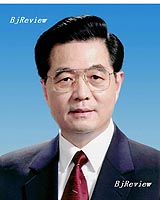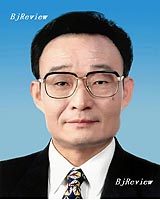| 
Hu Jintao
President, Chairman of the Central Military Commission
What is it like to lead 1.3 billion people and keep an extremely vast, complicated country on the track of sustained economic growth accompanied by ever-increasing international prestige?
China's Hu Jintao seems to have the answer.
The 65-year-old was elected on March 15 to another term of five years as both Chinese president and chairman of the Central Military Commission, the country's top military command, by nearly 3,000 members of the national legislature.
Five months ago, he was reelected general secretary of the Communist Party of China (CPC) Central Committee, the paramount decision-making body of the 73-million-member ruling party.
In the next five years, he will continue steering China in all major Party, state and military affairs.
He has proved himself a man of his word with a remarkable performance over the period.
When Hu first took over the helm of the country, what he and his colleagues in the new leadership had inherited was a 25-year economic miracle featuring a stunning average annual growth of near 10 percent, as well as problems and challenges long veiled behind the rosy gross domestic product (GDP) figures-widening urban-rural disparities, yawning income gap and deteriorating environment, just to name a few.
In the spring of 2003, almost immediately after the new Chinese leadership was installed, Hu and his colleagues were confronted with the sudden outbreak of severe acute respiratory syndrome (SARS).
One day in April, citizens in Guangzhou, capital of south China's Guangdong Province worst hit by the deadly epidemic, were surprised to see Hu, wearing no facial mask, appear on a bustling downtown commercial street, smiling and waving to passers-by.
According to Guangdong local officials, Hu flew to Guangzhou as soon as he learnt that the SARS epidemic was peaking in the city and causing widespread public panic.
But Hu wasn't there just to boost public morale. Actually, it was during this Guangdong trip that he first put forth the idea of "a comprehensive conception of development," apparently a well thought-out answer to those hidden problems that had surfaced during the SARS crisis.
Three months later in Beijing, Hu officially called for the endorsement of a new development model for the country, which he said should be more "comprehensive, balanced and sustainable" than the old GDP-oriented growth model.
Four years later, the new theory, now formally named the "Scientific Outlook on Development," was written into the Party Constitution at the 17th CPC National Congress, becoming a guiding principle for the country's efforts to build "socialism with Chinese characteristics."
Apart from the "Scientific Outlook on Development," Hu was also believed to be the mastermind and strong advocator of many other new political ideas and concepts that have gradually become popular phrases in the daily language of Chinese.
Most of these rather big political terms were simplified into short and easy-to-remember phrases of four Chinese characters, such as "yiren weiben" (putting people first), "hexie shehui" (harmonious society), "zhizheng nengli" (governance capability of the Party), and "barong bachi" (eight do's and eight don'ts for social ethics).
As China marks the 30th anniversary of its historic reform and opening-up policy this year, Hu has clearly stated that China will "unswervingly adhere to" this policy, which not only enjoys widespread support by the people, but also keeps up with the trend of the times.
When it comes to promoting democracy in the world's most populous nation, Hu not only has a practical roadmap, but also a feasible plan of implementation.
At the 17th CPC National Congress held in Beijing last October, Hu said in his keynote report that it is necessary to "expand intra-Party democracy to develop people's democracy."
Calling democracy "the lifeblood of socialism," Hu conspicuously mentioned the word "democracy" more than 60 times in his report. He also outlined the specific measures for improving intra-Party democracy, which include increasing transparency in Party affairs, adopting a tenure system for Party congress delegates, expanding voting for use at local Party committees, reforming the intra-Party electoral system, and gradually extending the direct election of leading members in primary Party organizations to more places.
Very few heads of state in the world could have a tighter diplomatic schedule than Hu over the past five years. He set foot in dozens of countries in both the developed and developing worlds. He shook hands with 48 heads of state and government from Africa at the Beijing Summit of the China-Africa Cooperation Forum, giving a strong push to the building of a new type of China-Africa strategic partnership.
Hu advocated the fresh concept of a "harmonious world" at the United Nations' 60th anniversary summit in 2005, explaining the Chinese view about international relations and reassuring the world of China's commitment to peaceful development.
A native of Jixi County in eastern Anhui Province, Hu was born in Taizhou City in neighboring Jiangsu Province in December 1942 and grew up there till he was enrolled in Tsinghua University.
Leaving the college in 1968, he had a long and rich experience of working in west China, 14 years in Gansu and eight years in Guizhou and Tibet.
In the early 1980s, Hu headed the Communist Youth League of China, the world's largest youth organization with more than 50 million members at that time.
Hu walked into the spotlight in 1992, when at the age of 49 he became the youngest member of the Standing Committee of the Political Bureau of the CPC Central Committee.
At the First Plenary Session of the 16th CPC Central Committee in 2002, he was elected general secretary of the CPC Central Committee, and was elected Chinese president the following March.
In 2004, he became chairman of the CPC Central Military Commission at the Fourth Plenary Session of the 16th CPC Central Committee.

Wu Bangguo
Chairman of the Standing Committee of the 11th National People's Congress
Pragmatic and amiable, Wu Bangguo has kept a low profile, though he and the National People's Congress (NPC) he leads have frequently come under the spotlight for their outstanding legislation and supervision efforts.
"The NPC exercises power collectively in accordance with the law. The chairman (of the NPC Standing Committee) enjoys the same power as the other deputies." These are the words Wu often says, largely to play down his role in the country's top legislature.
Nevertheless, he impressed the nearly 3,000 NPC deputies more than that, and was reelected as chairman of the NPC Standing Committee on March 15 at the NPC's annual full session.
In March 2003, Wu was elected as China's top legislator to succeed Li Peng.
The NPC is sovereign in China as it is authorized by the Constitution to elect the country's top leadership, enact laws and supervise the cabinet, the supreme court and the supreme procuratorate. The NPC Standing Committee serves as its executive body when the NPC is out of its annual full session.
Like other fellow lawmakers, Wu, known for his practical and low-key style, has worked hard quietly over the past five years.
However, the building of China's legal system was not that quiet and each step of progress had a bearing on the life of ordinary Chinese.
A total of 100 new or revised laws were adopted in China over the past five years, Wu said in a report to the NPC annual session.
The clauses that "the State respects and preserves human rights" and "the State, in accordance with the law, protects the rights of citizens to private property and to its inheritance" are for the first time enshrined in the amended Constitution, setting a milestone in China's constitutional history.
The landmark Anti-Secession Law, promulgated in 2005, provides a legal basis for the mainland's persistent stance to strive for peaceful reunification of the country and resolutely oppose and contain secessionist activities.
Observers see the Law on Property Rights, designed to put private property and state-owned property under indiscriminate protection, as the most brilliant progress achieved in Wu's tenure as the top lawmaker.
Wu, a native of Feidong, east Anhui Province, was born in 1941. He graduated from the Radio and Electronics Department of the prestigious Tsinghua University in 1960.
Wu came up through the ranks in Shanghai, where he became a Standing Committee member of the Shanghai Municipal Committee of the CPC in 1983 and Party chief in 1991. Through his reform measures, Shanghai was pushed to the frontline of China's reform and opening-up drive and cemented its status as the country's largest industrial city and economic hub.
Wu was elected member of the Political Bureau of the CPC Central Committee in 1992 and moved to work in Beijing two years later. He became vice premier in 1995.
During the following eight years as vice premier, Wu mainly took charge of economic work and trade, transportation and communications, energy, information industry and social security.
Wu likes to read or play tennis in his spare time. Though busy with work, he still manages to spare some time watching TV plays with his wife, Zhang Ruizhen.
| 